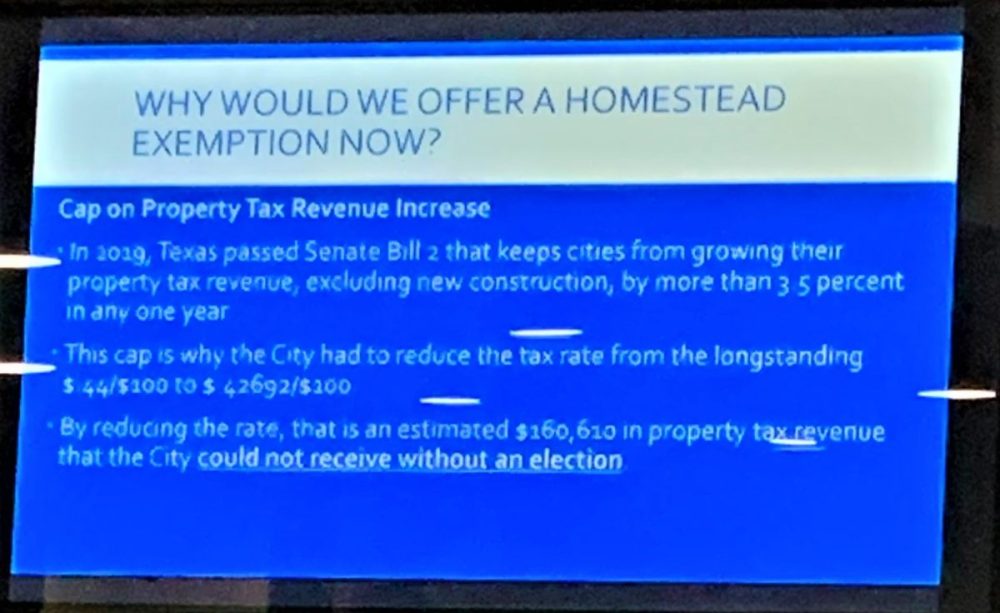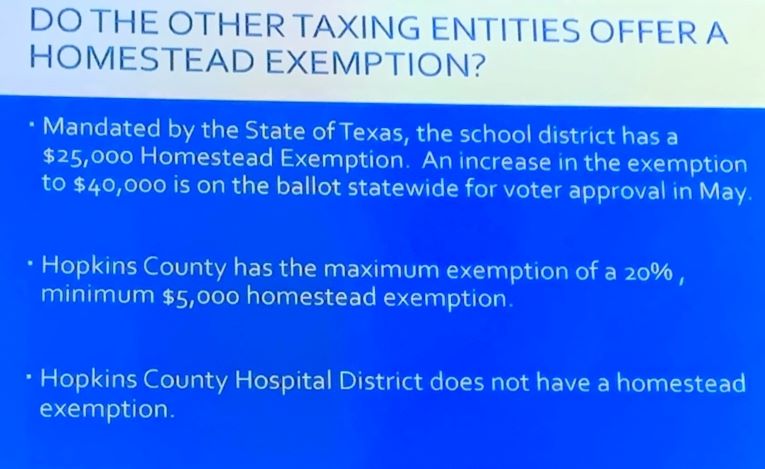A residential homestead tax exemption for city residents will be presented for consideration during the regular Sulphur Springs City Council meeting Tuesday, May 3, 2022
Sulphur Springs Assistant City Manager/Finance Director Lesa Smith in April presented information regarding a residential homestead property tax exemption option during the regular City Council meeting Tuesday evening, April 5, 2022.

Smith noted that a homestead exemption is simply a tax credit for an owner-occupied residential property. The exemption would reduce the taxing value on a home by the percentage set by the governing body, which in this case would be the City Council.
noting that there is a specific timeline that must be followed if the city officials want to consider granting homestead exemptions in any given year, as allowable by tax laws. A homestead exemption cannot be claimed by a property owner on more than one home. In other words, if the taxpayer owns five homes, that individual would only receive the exemption on the home he or she lives in.
A homestead exemption can be granted for up to 20% of the property value, but the minimum exemption is $5,000 of valuation. Aside from school districts, each taxing entity would determine the amount of exemption, if any, allowed for that tax.
Currently, school districts are mandated by the state to offer a $25,000 homestead exemption. The current election, however, includes a proposition asking Texas voters to consider increasing the amount of homestead exemption offered by schools from $25,000 to $40,000.
(Click here for more information on the Texas Constitutional Amendment propositions and voting information.)
In Sulphur Springs, taxpaying residents are offered a $25,000 homestead exemption on school taxes and the maximum 20% and minimum $5,000 homestead exemption on county taxes. The hospital district and city do not currently offer homestead exemptions for Sulphur Springs residents on their home property taxes.
Approximately, 5,020 single family homes are on the City of Sulphur Spring tax roll, that would mean about 54% of homes would qualify for a homestead exemption, if one were granted.
In other words, if the city had a 5% homestead exemption, that would be about $15.6 million of property value that’d be exempted for a total of $66,000 in property tax exempted. A 10% homestead exemption would be $31 million in property value exempted and approximately $133,000 exempted in property tax. A 20% homestead exemption would mean about $62 million in property value exempted and $266,456 in property tax exempted, according to Smith.
The city did take into account, when figuring the overall impact on city taxes, homesteads valued at $100,000 or less, which would actually be an exemption of more than 20% because their normal overall tax bill would be less than the $5,000 minimum exemption. So no matter what, if a homestead exemption is granted, individuals’ tax bills would receive no less than a $21.35 savings.

The average taxable value of a home in Sulphur Springs is $115,000. So the average homeowner would save $24.55 on their tax bill if the city were to set a homestead exemption at 5%, $49.10 savings with a 10% exemption, $73.65 savings with a 15% homestead exemption and $98.20 on a 20% exemption on the average home property valued at $115,000, Smith explained.
To be considered is the cap placed on property tax revenues in 2019 in Senate Bill 2, which reduced the tax rate from the longstanding 44-cents per $100 property valuation to 42.693 cents, which reduced city tax revenue by $160,610 unless a tax election is held. Of that amount, 41% of the savings from the reduced tax rate went to residential property owners and the remaining 56% to commercial and industrial property owners.
An imbalance between growth of commercial and residential properties and their values, set by appraisal districts in accordance with laws set by the state, is also another factor to consider. Residential appraisals are based on market values based on the amount homes are selling for in a given neighborhood, proving residential property owners with less room to protest appraised valued. There are several different ways commercial appraisals can be done on commercial property, especial that owned by large businesses.
“So while both businesses and residents are every important to the City, homestead exemptions allow the City to provide property tax savings to the residents first,” Smith said, at the April 5 meeting, providing a savings to the people who live and work in Sulphur Springs.
City Manager Marc Maxwell asked Smith to come back the May Council meeting with figures to show 10% growth and 20% homestead exemption, with the de minimis rate.
Smith agreed, noting that if the City Council wants to put for a vote a city homestead exemption, it would have to be approved by ordinance by July 1 in order to go on that tax year’s taxes. So in order to consider it this year, the proposed city homestead exemption ordinance is presented for first reading on the May 3 City Council agenda. If the ordinance receives initial approval Tuesday evening, it would then be presented again for second and final reading on June 7. The city would then receive tax values in July. The City Council would then need to approve a tax city property tax rate in September In order to levy the property tax in October.





